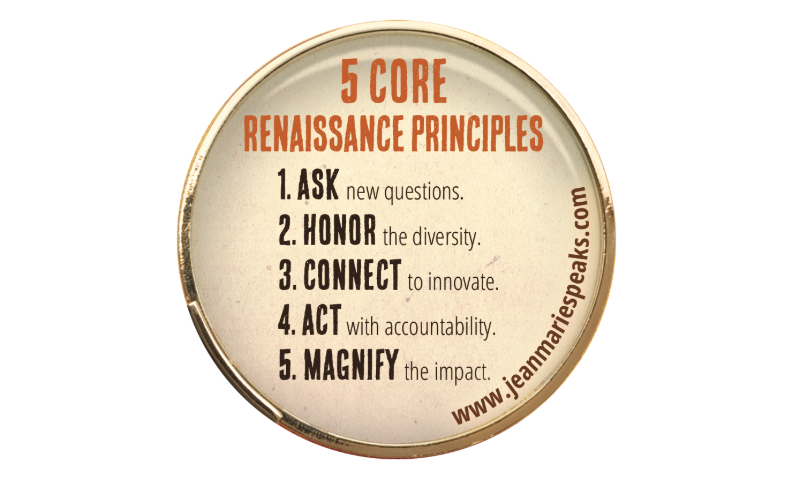Jean Marie DiGiovanna is an international keynote speaker, leadership educator, certified executive coach, and best-selling author. For the last 25 years, she has been helping leaders, and their teams shift the way they think, lead, and communicate creating a culture of increased trust, collaboration, and innovation. She is a master of experiential learning with a unique ability for asking the questions no one is asking and deeply listening for what’s not being said. She has a gift for creating a safe environment where leaders and their teams find their voice, speak their truth, and resolve conflict swiftly and gracefully. Jean Marie’s Renaissance Leadership Programs, her best-selling book, “Stop Talking Start Asking: 27 Questions to Shift the Culture of Your Organization”, and her LinkedIn Learning Course on “Communication Skills for Modern Management” helps companies across the globe develop strong leaders, build high trust teams and healthy work cultures.
The model of Command and Control is no longer working to engage and motivate employees. The lessons of the Pandemic uncovered a fundamental truth: individuals no longer seek merely a job—they yearn for meaningful work. They desire recognition for their full spectrum of gifts and talents, not just the ones needed for their role. They want to be acknowledged for their intrinsic value, not solely based on the results they deliver. Above all, they demand that their voices be heard, and their diversity respected.
We are in a time of REBIRTH – a rebirth of HUMANITY. If you look back in History, the Renaissance was also a rebirth of humanity and a time of invention and innovation.
We are in what I call the “NEXT” Renaissance. These times call for leaders who inspire trust, foster innovation, and navigate complexities with resilience. These times call for Renaissance Leaders who are multi-dimensional. They are creative, curious, caring, and collaborative and bring both breadth and depth of talent to their roles. Like Leonardo Da Vinci, they are not Jacks of all Trades; rather, they are Master of Many. They possess an insatiable curiosity to learn, they listen for what’s not being said, and they think like there is no box. They honor the unique brilliance of each team member and foster an environment of belonging that values diversity and respects every voice.
How can we think more like a Renaissance leader? Understanding the Five Core Renaissance Leadership Principles is the first step toward cultivating this mindset. As we dive into each principle, I invite you to engage in the self-reflection questions to explore how much you embody these traits and where there is room for expansion.

Renaissance Leadership Principle #1: ASK new Questions.
Renaissance Leaders are masters at asking powerful questions. Powerful questions ignite curiosity, open the dialogue, and inspire new thinking. As leaders, it’s so much easier to tell someone what to do, but as soon as we do that, the learning stops there. When the learning stops, organization fail. Developing a culture of curiosity, innovation and belonging comes not from knowing the answers, but from mastering the art of asking questions.
Recognizing that mastery is a dynamic process rather than a static destination, let’s turn the lens inward for self-reflection:
Self-Reflection Questions:
- On a scale of 1-10, how would you rate your level of curiosity at work and at home?
- What percentage of time do you find yourself instructing others versus responding with a question to stimulate independent thinking?
- Consider: What new and thought-provoking questions could you ask another today to ignite fresh perspectives and insights? (HINT: Powerful questions typically start with a “What?” or “How?”)
Renaissance Leadership Principle #2: HONOR the Diversity (of ideas, perspectives & people)
While asking new questions is pivotal, it is the genuine openness to diverse answers that defines a true Renaissance Leader. Authentic listening becomes the conduit through which diversity is honored and valued, but it’s not easy. It demands temporarily setting aside one’s judgments and instead, creating a space for exploration. When we genuinely listen to respect and not reject, we create a culture of openness, belonging and innovation.
Self-Reflection Questions:
- In your conversations, how often do you find yourself preoccupied with thinking about your next response rather than fully engaging in the present moment? (p.s. Welcome to being human!)
- What might you need to let go of to listen free from judgment? (at least for one conversation…at a time)
- Identify someone you may have been unfairly judging. What is a question you could ask them that comes from a place of genuine curiosity?
Renaissance Leadership Principle #3: CONNECT to Innovate
Renaissance Leaders actively seek advice, solutions and learning from people and domains that are different from them. They recognize the transformative power that happens when they step outside their comfort zone. During the Renaissance period, Lorenzo Di Medici, brought together experts from the arts, literature, engineering, philosophy, and science to tackle monumental challenges. He recognized the wealth of insights diverse minds can offer. When we are willing to connect the unexpected dots, we foster an environment where groundbreaking solutions emerge.
Self-Reflection Questions:
- Who is most unlike you, someone you would rarely seek advice from?
- What would it take to reach out and set up a virtual coffee, asking for their advice on a challenge you are facing?
- What domain area or business is very different from yours? What would be possible if you sought out Executives from that business to mastermind with you?
Renaissance Leadership Principle #4: ACT with Accountability
Renaissance Leaders recognize that taking responsibility for both actions and inactions is paramount for navigating challenges with agility and effectiveness. They acknowledge the impossibility of directly holding someone else accountable; instead, they create an environment that fosters individual ownership. They empower others to take responsibility and report back on their progress, whether they succeed or encounter obstacles. They also recognize that success is a shared pursuit. “If one of us fails, all of us fails.” This principle serves as a linchpin for turning innovative thinking into tangible outcomes.
Self-Reflection Questions:
- How do you hold yourself and others accountable in your organization?
- To what extent do you proactively discuss strategies for handling potential challenges, such as missed deadlines, before they arise?
- Reflect on your post-conversation practices. How often do you engage in discussions about accountability after important actions come out of meetings?
Renaissance Leadership Principle #5: MAGNIFY the IMPACT
Implementing great ideas is essential, yet their true power often dissipates if not effectively shared, leveraged, and expanded upon. The true power of an idea lies in its ability to create a ripple effect. What could be possible if your ideas transcended the boundaries of your immediate team, department, or organization? The power to magnify the impact lies in the willingness to share, collaborate, and contribute to a global tapestry of ideas and solutions.
Self-Reflection Questions:
- Reflect on recent ideas you’ve implemented. How might they positively impact individuals or groups outside of your immediate team, organization, or industry?
- Identify ideas you may be holding closely. Consider the potential benefits if these ideas were shared more broadly.
- Whose lives or endeavors could be positively influenced by the ideas you currently possess, creating broader benefit for the greater good?
IN CLOSING:
When you implement these Five Core Renaissance Leadership Principles, you foster a culture of authenticity, trust, connection, innovation, and accountability and create an environment where people feel heard, seen, understood, and valued.
Which Renaissance Leadership Principle are you willing to work on this quarter with your team, department, or organization? What if you took it on like an experiment where you cannot fail? You can only learn more about yourself and others and in doing so grow and develop your skills, mindset, talents, and experience.
Feel free to reach out and share your experiences or pose any questions you may have. My virtual door is always open. In the meantime, become the Renaissance Leader these times need us to be.

